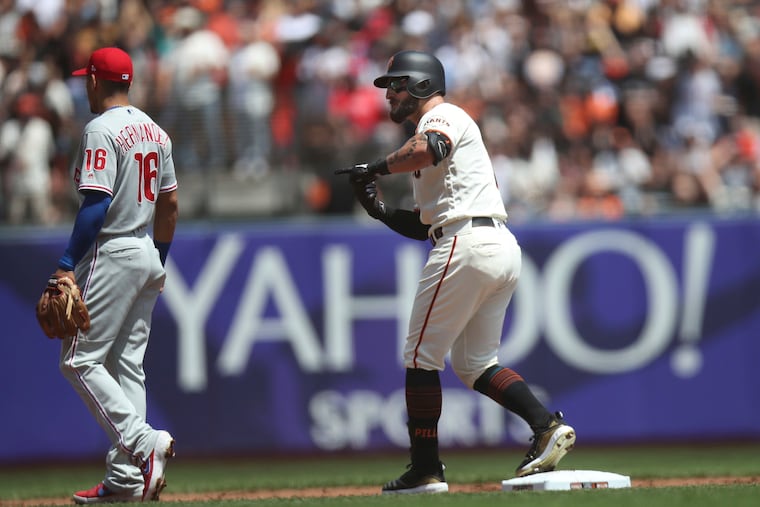Phillies’ disappearing offense gets shushed once again in another loss to Giants
For the second time in three games against the San Francisco Giants, the Phillies' offense was an almost complete no-show.

SAN FRANCISCO -- When Bryce Harper crossed home plate after clocking the first of his two home runs Friday night, he pressed a finger to his lips and shushed the crowd here at Oracle Park.
A day later, Jeff Samardzija essentially did the same to the Phillies.
For the second time in three games against the San Francisco Giants, the Phillies were almost complete no-shows. This time, in Saturday's 3-1 loss, they were held to two hits over eight innings by Samardzija, who retired 20 consecutive batters at one point for his second dominant start against them in 11 days.
So much for the Phillies deriving momentum from the Harper-fueled nine-run outburst Friday night. Every time you think they're poised to finally bust out, the offense disappears like the Golden Gate Bridge in the fog over San Francisco Bay.
"I don't know," Harper said after the Phillies lost for the sixth time in eight games and remained on the outside of the National League playoff picture. "We prepare every day the same. We come in here and want to hit the ball. We want to score runs and get those runs on the board, so I'm not sure [what happens]."
To hear the Phillies tell it, the latest offensive outage had more to do with Samardzija than anything. The veteran right-hander mixed a fastball and cutter that Phillies hitters said tend to appear similar out of his hand. They couldn't hit Samardzija for six innings on July 31 at Citizens Bank Park, and he was even better against them this time.
Corey Dickerson gave the Phillies a 1-0 lead with a two-out home run in the first inning. After that, though, they didn't have another hit -- nay, another baserunner -- until Cesar Hernandez's one-out single in the eighth before mounting an ultimately unsuccessful rally in the ninth against Giants closer Will Smith.
“I think we could do a better job of carrying [Friday] night’s momentum into today,” manager Gabe Kapler said. “At the same time, I think it’s professional and accurate to give the opposing starter some credit, and Samardzija has been really good against us two straight outings.”
But games like this have been the norm recently. The Phillies are batting .200 (31-for-155) with runners in scoring position over the last 19 games. They were held to one hit through five innings Wednesday night in Arizona by rookie Zac Gallen. They had one hit overall -- Hernandez’s pinch single -- in Thursday night’s 5-0 whitewash by the Giants.
And then came Samardzija’s mastery of them on Saturday, when the Giants supported him with a two-run homer by Evan Longoria in the second inning and a solo shot by Kevin Pillar in the fifth off starter Vince Velasquez.
Is it any wonder the Phillies are 27-35 since May 29, when they led the NL East by 3 1/2 games? After losing to the Giants on Saturday, they were in fourth place, a half-game behind the surging New York Mets.
The Phillies like to tout their 52-15 record when they score at least four runs in a game. Problem is, they don't achieve that output often enough. They have reached the four-run mark in only 67 games, fewer than only the Giants among the seven teams in the National League wild-card hunt.
“We’re just not a team that’s built to shut out the opposition on a regular basis,” Kapler said. “In some form or fashion we have to scratch out runs. We’ve all read the four-run stat. We have to find a way to get to that magic number more frequently.”
Instead, they have been held to three hits or less in more than one game of a series for the first time since May 22-24, 2017, against the Rockies. They have a 2-4 record on a western road trip that wraps up Sunday night against Giants rookie left-hander Conner Menez, who will be making his third career big-league start.
“Dickerson started off well for us and thought as a group we were going to have a big day. Samardzija had different plans," Harper said. "I thought we put some good swings on the ball, but that’s baseball. Sometimes they’re going to fall, sometimes they’re not.”
For the Phillies, more hits need to start falling before they do.